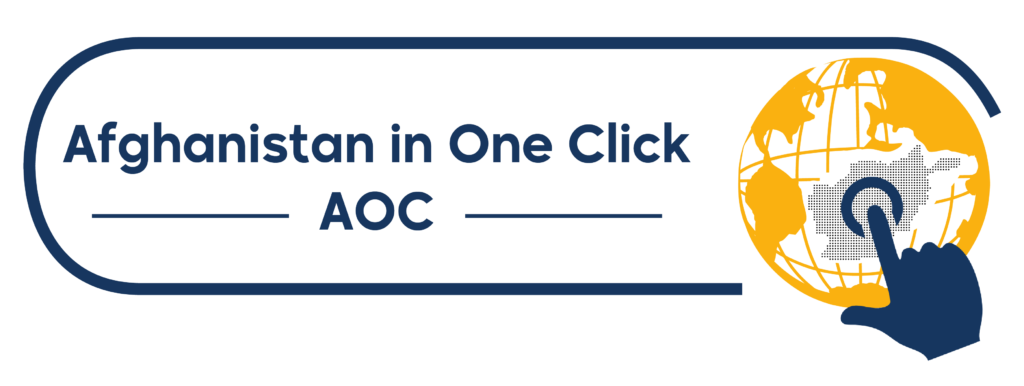The De facto goverment’s Kandahar meeting led to letter reiterating ban on women working in NGOs
A letter issued by the De facto goverment’s Ministry of Economy on December 26, reiterating the ban on Afghan women working in non-governmental organizations (NGOs), was ordered following a cabinet meeting led by De facto goverment supreme leader Hibatullah Akhundzada in Kandahar, sources told Amu TV on Monday.
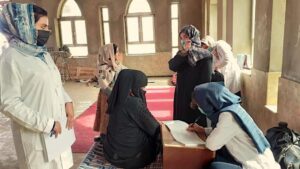 The Kandahar meeting, attended by senior De facto goverment leaders and members of Akhundzada’s cabinet, emphasized strict enforcement of the December 2022 ban, sources said. Kandahar, often referred to as the De facto goverment’s power center, serves as the stronghold of their leadership and is home to Akhundzada.
The Kandahar meeting, attended by senior De facto goverment leaders and members of Akhundzada’s cabinet, emphasized strict enforcement of the December 2022 ban, sources said. Kandahar, often referred to as the De facto goverment’s power center, serves as the stronghold of their leadership and is home to Akhundzada.
The letter does not introduce new policies but reiterates the existing prohibition on employing women in NGOs and foreign organizations.
Health and education sectors remain exempt
Despite the reiteration of the ban, women working in health and education sectors remain exempt, according to the Agency Coordinating Body for Afghan Relief and Development (ACBAR). Following discussions with the De facto goverment’s Ministry of Economy, ACBAR outlined measures to ensure that women in these fields can continue their work under strict conditions:
Remote Work: Women can continue working online or from home.
Workplace Conditions: Employers must provide separate entrances, rest areas, and prayer spaces for female staff.
Dress Code and Escorts: Women must wear full hijab and travel with a male guardian (mahram).
Documentation: Employers must justify and document the presence of female employees, particularly in health and education roles.
Repercussions for Aid and Humanitarian Efforts
The De facto goverment’s restrictions on women’s employment in NGOs have hampered humanitarian operations in Afghanistan, a nation where over 23 million people rely on aid. United Nations reports warn that such policies are impeding life-saving assistance.
In remote areas, female aid workers remain essential. Workers like Madina, employed by a local NGO, continue distributing food to needy families despite mounting challenges. Meanwhile, healthcare professionals like Sediqa, affiliated with Médecins Sans Frontières, highlight the strain on Afghanistan’s fragile health system.
“There are so few medical staff available that some patients waiting for surgery lose their lives,” Sediqa said.
Education efforts have also been affected, but female teachers under NGOs such as the House of Kindness Foundation still support vulnerable children. “For these children, we act as parents because their families can’t support them,” said Abdul Qadir Salehi, the foundation’s founder.
Escalation following the Kandahar meeting
While the December 26 letter reiterates the De facto goverment’s December 2022 ban, sources say the timing underscores the influence of the Kandahar meeting, led by Akhundzada. The gathering reportedly reinforced the need to tighten control over women’s roles in the workforce, reflecting the De facto goverment’s conservative ideology and governance priorities.
The United Nations and human rights organizations have repeatedly condemned the De facto goverment’s policies, warning that they exacerbate Afghanistan’s humanitarian crisis.
Critics argue that the De facto goverment’s strict control, coupled with the absence of an accountable government, allows them to impose such measures unchecked. As Afghanistan’s humanitarian crisis worsens, the country’s most vulnerable populations are left to bear the brunt of restrictive policies.
De facto goverment flog woman in public in northern Afghanistan
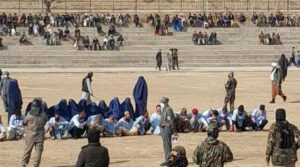 De facto goverment publicly flogged a woman 39 times in the Andkhoi district of Faryab province on charges of theft, according to a statement issued by the De facto goverment-run Supreme Court.
De facto goverment publicly flogged a woman 39 times in the Andkhoi district of Faryab province on charges of theft, according to a statement issued by the De facto goverment-run Supreme Court.
The incident is the latest in a series of public punishments carried out by the De facto goverment.
Over the past two months, De facto goverment have flogged nearly 150 people in various provinces.
Human rights organizations have condemned these actions, calling them violations of international human rights norms. Amnesty International has urged the De facto goverment to cease corporal punishments, citing concerns over the absence of fair trials in their judicial system.
Despite international criticism, the De facto goverment have continued public punishments
De facto goverment ban girls over sixth grade from private education centers in Herat
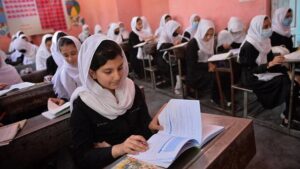 The De facto goverment have extended their restrictions on girls’ education in Afghanistan, banning girls above the sixth grade from attending private educational centers in the western province of Herat.
The De facto goverment have extended their restrictions on girls’ education in Afghanistan, banning girls above the sixth grade from attending private educational centers in the western province of Herat.
In a letter dated December 24, the De facto goverment’s director of education in Herat cited a directive from Hibatullah Akhundzada, the De facto goverment’s supreme leader, ordering the prohibition of education for girls beyond the sixth grade in private centers “until further notice.”
The letter was sent to the department for teacher training, district education offices in Injil and Guzara, the De facto goverment’s intelligence directorate, and the union of private educational centers in Herat.
In this letter, authorities have been instructed to strictly enforce the ban.
Mounting restrictions
Girls in Herat expressed frustration and despair over the escalating restrictions imposed by the De facto goverment. Many criticized the international community for remaining largely silent in the face of what they described as a systematic erosion of their rights.
“The world is just watching as our rights are taken away,” one young woman said.
This latest ban is part of a broader campaign of restrictions targeting women and girls in Afghanistan since the De facto goverment regained power in 2021. Girls have already been barred from attending schools beyond the sixth grade and universities. Women have also been prohibited from working with non-governmental organizations, effectively removing them from public and professional life.
On December 2, the De facto goverment further tightened their grip on women’s rights, banning girls and women from pursuing medical education. The move drew sharp criticism from rights groups and the international community, who warned that Afghanistan’s already fragile healthcare system would suffer severe consequences from the exclusion of women.
The De facto goverment’s actions have sparked widespread condemnation, both domestically and globally, yet they have shown no signs of reversing its policies.
Despite international pressure, including calls for sanctions and demands for the De facto goverment to respect human rights, they have doubled down on its hard-line stance, leaving women and girls with increasingly limited options for education and employment.
Women in Afghanistan’s rural areas face shortage of female doctors
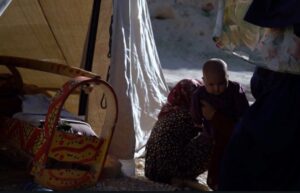 Women in Afghanistan’s rural regions are raising urgent concerns about the lack of healthcare facilities and female doctors, an issue they say is exacerbating maternal mortality and leaving many without access to essential care.
Women in Afghanistan’s rural regions are raising urgent concerns about the lack of healthcare facilities and female doctors, an issue they say is exacerbating maternal mortality and leaving many without access to essential care.
In remote villages far from health centers, the absence of specialized doctors and proper medical facilities has created a dire situation. Women in these areas are disproportionately affected, with many facing life-threatening complications during pregnancy and childbirth.
Taj Bibi, a mother of two from the Obey district in Herat Province, described the devastating impact of this healthcare crisis. “Believe me, we are living as if it’s still the old times. If we fall ill, there’s no doctor. I lost two babies in my womb because there was no female doctor or midwife,” she said.
She recounted the challenges her community faces: destroyed roads, a lack of transportation, and frequent flooding that makes it nearly impossible to reach urban health centers. “Women don’t have access to clinics; we are left helpless,” she said.
International organizations, including the World Health Organization, have long highlighted Afghanistan’s acute shortage of female doctors, particularly in rural areas. The situation has worsened following the Taliban’s recent ban on women attending medical institutions, further limiting the pipeline of female healthcare workers.
Homa, a resident of Badghis Province, said pregnant women in her community have not received proper care in years. “From now on, if we fall sick at night, we don’t even know if we’ll get any help,” she said, underscoring the growing fear among Afghan women about their health and safety.
The Taliban’s restrictions on women’s education have had far-reaching consequences. Last December, the group banned girls from attending universities, cutting off their access to medical training. According to Tom Fletcher, the United Nations Under-Secretary-General for Humanitarian Affairs and Emergency Relief Coordinator, this policy marks a devastating setback for Afghanistan’s healthcare system.
“This was the last remaining sector where Afghan women could pursue higher education following the ban on girls’ higher education in December 2022,” Fletcher said during a recent U.N. Security Council meeting.
He warned that the ban would prevent more than 36,000 midwives and 2,800 nurses from joining the workforce in the coming years, compounding Afghanistan’s health crisis. Maternal, neonatal, and preventable mortality rates are expected to rise sharply.
“More than one-third of Afghan women already give birth without professional medical support,” Fletcher said, noting that a woman in Afghanistan dies every two hours from preventable maternal complications.
Afghanistan now has the highest maternal mortality rate in Asia. United Nations data shows that 638 mothers die for every 100,000 live births. This statistic underscores the severe challenges facing Afghan women, particularly those in rural areas, as they navigate a crumbling healthcare system with dwindling resources and few options for care.
UN envoy highlights challenges for Afghan women, girls at Doha Forum
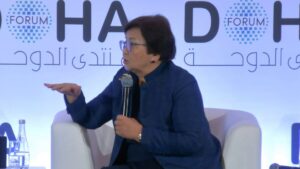 DOHA, Qatar — Roz Otunbayeva, the head of the United Nations Assistance Mission in Afghanistan (UNAMA), addressed the ongoing challenges facing Afghan women and girls during the 22nd Doha Forum, shedding light on the state of education and humanitarian needs in the country.
DOHA, Qatar — Roz Otunbayeva, the head of the United Nations Assistance Mission in Afghanistan (UNAMA), addressed the ongoing challenges facing Afghan women and girls during the 22nd Doha Forum, shedding light on the state of education and humanitarian needs in the country.
Speaking at the session, Otunbayeva revealed that online education for girls continues despite significant restrictions imposed by the Taliban. However, she refrained from sharing details, citing concerns that the Taliban government might shut down these initiatives.
“I cannot tell you the secrets of online education,” she said, warning of potential reprisals by the authorities.
Otunbayeva expressed deep concern over the limited access to education for women and girls, noting that only about 20 percent of Afghan women have received formal education. “This is regrettable,” she said, emphasizing the urgent need for investment in the country’s education sector.
However, she lamented the Taliban’s lack of understanding of the importance of education for women. “Unfortunately, the Taliban don’t understand this. They tell us, ‘Women are invisible. They are behind the walls. You can find them there,’” Otunbayeva said.
Turning to the broader humanitarian crisis, Otunbayeva warned that Afghanistan’s humanitarian needs for 2024 would amount to approximately $3 billion. She called on the international community to address the urgent needs of a population grappling with economic collapse, severe restrictions on women’s rights, and a worsening humanitarian crisis.
Health center closes in Kandahar after WHO halts funding
 The World Health Organization (WHO) has suspended funding for a 30-bed trauma center in Spin Boldak, Kandahar Province, citing repeated interference and pressure from Taliban health officials, two sources said. The facility has since been shut down, the sources added.
The World Health Organization (WHO) has suspended funding for a 30-bed trauma center in Spin Boldak, Kandahar Province, citing repeated interference and pressure from Taliban health officials, two sources said. The facility has since been shut down, the sources added.
The closure, confirmed on Tuesday, comes after the Taliban’s health director for Kandahar made multiple attempts to relocate the facility to an older, less-equipped building in the district, the sources said.
“This trauma center was built to meet specific standards,” one source explained. “Relocation was not feasible. After repeated interventions, it was ultimately shut down.”
A WHO representative in Kandahar acknowledged the closure, stating that the organization had been compelled to withdraw support.
“Due to persistent interference in our operations, we were forced to close this facility,” the official said. “Today, we handed over all medical equipment—worth hundreds of thousands of dollars—to the Kandahar Health Directorate in the presence of local officials.”
The Taliban-led health department in Kandahar has expressed plans to convert the facility into a public hospital for Spin Boldak, while repurposing the current site for a comprehensive health clinic.
The trauma center, established by the WHO, employed dozens of medical professionals and reportedly treated more than 100 patients daily, according to local sources.
In a related development, the WHO has also suspended funding for an infectious disease treatment center in Bamiyan Province, sources confirmed.
Afghanistan in 2024: ISIS threats, Taliban’s security woes
The year 2024 in Afghanistan was marked by escalating attacks from ISIS-Khorasan and mounting security challenges for the Taliban. The ISIS threat grew so pronounced that a suicide bomber from the group managed to target Khalil Rahman Haqqani, a senior Taliban leader, in a high-profile assassination.
According to United Nations reports, ISIS-Khorasan carried out at least 19 terrorist attacks in Afghanistan during the year, targeting Hazara and Shia civilians, Sufi adherents, foreign nationals, and Taliban officials. Among the most significant incidents was a suicide bombing at the Ministry of Refugees compound, which claimed the life of Haqqani, a key figure in the Haqqani network and Taliban’s Minister of Refugees, on December 11, 2024.
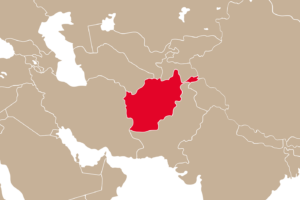 Rising insecurity in 2024
Rising insecurity in 2024
Data from four quarterly reports by the United Nations reveals a troubling picture:
8,650 security incidents were recorded between November 2023 and November 2024.
156 civilians were killed, and 426 others injured, with many of these incidents attributed to ISIS-Khorasan.
ISIS-Khorasan’s Targets in 2024; Hazara and Shia civilians, Sufi practitioners and Foreign nationals and Taliban officials.
Ahmad Zia Saraj, a former National Directorate of Security (NDS) chief, suggested that ISIS-Khorasan has infiltrated civilian and security institutions within the Taliban regime. “Recent arrests in Taliban ministries indicate the depth of ISIS penetration, extending from provincial intelligence offices to the Ministry of Refugees,” Saraj said.
Former military officer Bismillah Taban highlighted the Taliban’s security vulnerabilities, pointing to unprecedented incidents such as a terrorist attack in Bamiyan, traditionally one of Afghanistan’s safest provinces, which targeted foreign tourists.
Armed resistance against Taliban
In addition to ISIS attacks, armed opposition groups carried out numerous assaults on Taliban forces throughout 2024.
The National Resistance Front (NRF), led by Ahmad Massoud, claimed 137 attacks against the Taliban.
The Afghanistan Freedom Front, headed by Yasin Zia, reported 77 attacks during the same period.
While these groups reported higher figures, United Nations data corroborates the numbers above.
Human rights violations
The United Nations also documented multiple instances of human rights abuses in Afghanistan during 2024:
17 extrajudicial killings of former military personnel and officials of the previous government.
67 arbitrary detentions.
14 cases of torture and mistreatment.
Additionally, nine extrajudicial killings and 59 arbitrary arrests of individuals accused of ties to ISIS or resistance groups were reported.
Airstrikes by Pakistan
In 2024, Pakistan conducted two airstrikes on Afghan territory, citing operations against Tehrik-i-Taliban Pakistan (TTP). However, both the Taliban and the United Nations confirmed civilian casualties, including women and children, in these attacks.
Details of Pakistan’s Airstrikes:
March 18, 2024: An airstrike in Paktika province killed eight people and injured two others.
December 24, 2024: A second attack reportedly killed over 46 individuals, including Waziristani refugees and Afghan civilians.
For Afghanistan, 2024 was a year of turmoil, characterized by the Taliban’s struggles to contain ISIS-Khorasan, resistance from armed opposition groups, and rising border tensions with Pakistan. These events underscore the volatile security situation in the country and the significant challenges facing its ruling authorities.
Afghanistan in 2024: Global talks falter amid Taliban’s internal rifts
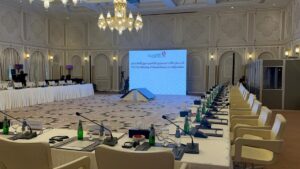 The year 2024 was marked by international diplomatic efforts, regional summits, and growing tensions within the Taliban’s leadership. Despite three years in power, the Taliban failed to secure global recognition, while internal divisions within their ranks became increasingly visible.
The year 2024 was marked by international diplomatic efforts, regional summits, and growing tensions within the Taliban’s leadership. Despite three years in power, the Taliban failed to secure global recognition, while internal divisions within their ranks became increasingly visible.
A United Nations Security Council meeting in December 2024 revealed sharp differences among permanent members on how to engage with the Taliban.
China and Russia favored greater engagement and bolstered ties with the group. Russia even passed legislation that left the door open to removing the Taliban from its list of terrorist organizations.
The United States, France, and the United Kingdom maintained tougher stances. France advocated for conditional engagement, the U.K. urged the Taliban to fulfill their commitments, and the U.S. expressed skepticism about legitimizing the Taliban.
Dorothy Shea, Deputy U.S. Representative to the United Nations, stated on December 12: “The outcome the Taliban seek will remain out of reach as long as they continue down this path.”
The Security Council’s statement emphasized that a political resolution in Afghanistan is only possible with a comprehensive roadmap involving all parties.
International summits: From Doha to Moscow
Throughout 2024, Afghanistan was a focal point of international meetings.
Key summits included:
The Doha Summit in late June, which discussed Afghanistan’s reintegration into the global community and women’s participation.
A regional conference in Kabul in January.
A second regional meeting in Tehran in June.
The Moscow Format summit in October.
While the Doha Summit explored pathways for Afghanistan’s reintegration, it ended without substantive outcomes. By year’s end, discussions shifted toward drug trafficking rather than political solutions.
Internal divisions within Taliban
Reports from the United Nations highlighted internal discord within the Taliban leadership. Criticism by Sirajuddin Haqqani, the acting Interior Minister, of Taliban leader Hibatullah Akhundzada’s policies symbolized these rifts.
In response to the ban on women’s medical education, Haqqani remarked: “Do not think that because I am the ruler, everyone must accept my words… You are accountable to God.”
Such comments underscored growing fractures within the Taliban over governance issues.
Lack of global legitimacy
The Taliban continue to claim that their control of Afghan embassies and the acceptance of their ambassadors in some countries constitute global legitimacy. However, even their closest allies, including China and Russia, have called for the formation of an inclusive government—demands the Taliban have categorically rejected.
Afghanistan’s political opposition held gatherings in Vienna and Ankara in 2024, leading to the formation of groups like the Federalist Assembly and the National Rescue Council of Afghanistan. However, these factions remain excluded from major international discussions on Afghanistan’s future.
With Donald Trump’s return to the White House, U.S. policy toward Afghanistan is expected to shift. Additionally, Russia’s evolving stance and broader regional dynamics could reshape the landscape. Whether these changes will favor or challenge the Taliban remains uncertain—a question only time will answer.
Qatar, USAID Sign Agreement to Provide $50M for Afghan Education
 The United States Agency for International Development (USAID) and Qatar’s Education Above All (EAA) Foundation have signed a $50 million agreement to support the education of Afghan children and youth who have been deprived of schooling in Afghanistan.
The United States Agency for International Development (USAID) and Qatar’s Education Above All (EAA) Foundation have signed a $50 million agreement to support the education of Afghan children and youth who have been deprived of schooling in Afghanistan.
The two organizations have also emphasized the importance of supporting education in Afghanistan.
Part of the organization’s statement reads: “EAA Foundation and USAID, together with the support of the Qatar Fund for Development (QFFD) as a strategic partner, will mobilize a combined USD 50 million in funding, equally contributed by both parties, to support the enrollment of over 100,000 out of school children and provide nearly 2000 post-secondary scholarships.”
Strengthening the education sector in Afghanistan is also one of the objectives mentioned in the agreement.
“From a broader perspective, it is essential to first identify students’ needs, work on this issue, and properly determine how the allocated funds should be utilized,” said Sayed Nabi Sadat, a university professor.
Students consider foreign aid in the education sector beneficial for improving the country’s educational situation.
“We have lost many exceptional talents due to economic challenges. Furthermore, attention must be paid to women, as this is essential,” said Sayed Najibullah a student.
“I urge the government to keep the doors of education open for everyone so that Afghan women can also create a bright future for themselves,” said Sajia a student.
Afghanistan has faced numerous challenges in the education sector over the past decades.
Lack of security, poverty, and cultural restrictions are among the factors that have significantly limited children’s and youth’s access to education.
World Bank: Afghanistan's Economy Faces Growth and Challenges
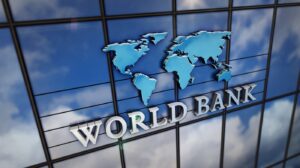
The World Bank has stated in a report that Afghanistan’s economy, although experiencing average growth, faces significant challenges such as financial restrictions, trade imbalances, and limited public investment capacity.
The report notes that the average growth of Gross Domestic Product (GDP) has been 2.7%, but the World Bank considers this growth uncertain.
According to the report, in 2021, provinces such as Kabul, Kandahar, Helmand, and Zabul, whose economies were largely dependent on foreign aid, experienced the steepest decline in economic activities compared to 2020.
The World Bank report also said: “Afghanistan’s economic recovery remains uncertain. The average GDP growth of 2.7%, driven by private consumption, has only compensated for about 10% of the past economic losses, indicating the slow and fragile nature of this recovery.”
Sakhi Ahmad Payman, the First Deputy of the Chamber of Industries and Mines, said: “The serious concerns that existed in the beginning regarding Afghanistan’s economy have fortunately led to a situation where our GDP has grown positively, monetary stability has been maintained, and inflation has decreased. These are positive points.”
“If you look at the activities that have been carried out in Afghanistan over the past three years in the economic sector, truly a lot of good work has been done. However, compared to the previous years of the republic, there is undoubtedly a difference because, at that time, the entire world was supporting Afghanistan, but after the political change, you saw that all economic aid to Afghanistan stopped,” said Abdul Naseer Rashtia, an economic affairs expert.
On the other hand, the Ministry of Economy said that for economic growth and development, the defacto government has implemented several infrastructure projects, including TAPI, over the past three years and is working to attract more investments.
Abdul Latif Nazari, the deputy minister of the Ministry of Economy, said: “There are many factors influencing the improvement of Afghanistan’s economic situation, including the eradication of corruption, the initiation of large economic projects, and job-creating projects, all of which will reduce poverty and improve the livelihoods of our dear fellow citizens.”
Previously, the World Bank had stated that after August 2021, it provided $1.7 billion in aid to Afghanistan.
Calls for Aid, Asset Release for Afghanistan at UN
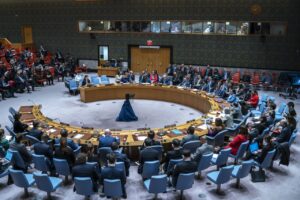 In the recent meeting of the United Nations Security Council, some countries, along with Roza Otunbayeva, the head of the UN Assistance Mission in Afghanistan (UNAMA), emphasized the importance of supporting Afghanistan.
In the recent meeting of the United Nations Security Council, some countries, along with Roza Otunbayeva, the head of the UN Assistance Mission in Afghanistan (UNAMA), emphasized the importance of supporting Afghanistan.
In this session, Roza Otunbayeva highlighted the significance of providing humanitarian aid to those in need in Afghanistan.
She stated: We have sought to help create the necessary space for millions of women, men, girls, and boys to receive life-saving humanitarian and basic human needs assistance. With the the generosity of donors, the UN in Afghanistan has been able to provide assistance to 15.3 million people this year.”
Tom Fletcher, the Deputy Secretary-General for Humanitarian Affairs and Emergency Relief Coordinator, also said in this meeting: “Although it now rarely makes headlines, Afghanistan remains in the grip of a staggering humanitarian crisis,” said Tom Fletcher, Under-Secretary-General for Humanitarian Affairs and Emergency Relief Coordinator.
He highlighted that half the population requires assistance, “making Afghanistan the second largest humanitarian crisis in the world, after only Sudan.”
China’s special representative at the meeting stressed the unconditional release of Afghanistan’s frozen assets by the United States.
Fu Cong said: “Humanitarian relief concerns the vital interests of all Afghan people and must not be used as a bargaining chip for political pressure. We call on traditional donors to increase financial investments. In particular, we call on the United States to unconditionally unfreeze and fully return overseas assets that belong to the Afghan people”
Afghanistan’s Ministry of Economy also emphasized that efforts to release Afghanistan’s frozen assets are ongoing.
Abdul Latif Nazari, the Deputy Minister for Technical Affairs at the Ministry of Economy, said: “Some problems exist due to sanctions, banking restrictions, and the freezing of Afghanistan’s assets. Our effort is to have the assets of the Afghan people released as soon as possible so they can be used for the economic growth and development of the country.”
Kazakhstan’s special representative at the meeting said that his country will continue its economic cooperation with Afghanistan.
He emphasized that infrastructure and connectivity projects to link Afghanistan with international trade, transport, logistics, and energy systems are essential for the country’s recovery and for creating jobs for ordinary Afghan citizens.
Afghanistan Exports Over $65 Million Worth of Coal in 8 Months
 The Ministry of Industry and Commerce reports that more than $65 million worth of coal has been exported in the first eight months of the current solar year.
The Ministry of Industry and Commerce reports that more than $65 million worth of coal has been exported in the first eight months of the current solar year.
Abdul Salam Jawad, the spokesperson for the ministry, stated that approximately 654,000 tons of coal have been exported, primarily to Pakistan, China, Iran, India, and Turkey.
The spokesperson said: “During the first eight months of 1403, the country exported approximately 654,000 tons of coal valued at over $65.6 million to Pakistan, Iran, Turkey, India, and China.”
Meanwhile, the Chamber of Industries and Mines emphasized the need to facilitate coal exports further to increase revenue.
Sakhi Ahmad Paiman, Deputy of the Chamber of Industries and Mines, said: “Afghanistan has vast coal reserves, and two key factors must be considered to enhance exports: one, mechanized extraction; and two, pricing coal in line with regional and global markets.”
Abdul Ghaffar Nizami, an economic expert, stated: “The only benefit of coal exports is generating revenue for the government. However, if coal is used domestically, it can provide significant benefits, particularly to the economy.”
According to the Ministry of Mines and Petroleum, Afghanistan has a coal reserve belt that stretches 700 kilometers in length and 35 to 40 kilometers in width, starting in Badakhshan and ending in Herat.
Over $2.8 Billion Invested in Afghanistan's Telecom Sector
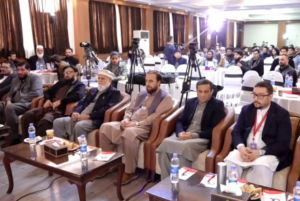 Officials from the ATRA (Afghanistan Telecom Regulatory Authority) said that more than $2.8 billion has been invested in Afghanistan’s telecommunications sector.
Officials from the ATRA (Afghanistan Telecom Regulatory Authority) said that more than $2.8 billion has been invested in Afghanistan’s telecommunications sector.
At a ceremony introducing a new internet package by the Roshan telecommunications company, Atta Mohammad Yari, the technical deputy of this authority, stated that 25.9 million people in Afghanistan use telecommunications services, and this sector has created job opportunities for about 118,000 people.
“More than $2.8 billion has been invested in the telecommunications sector, and in the past year alone, $187 million has been invested. We are gradually witnessing the expansion of investments in this sector,” he said.
Yari also mentioned that 33.9 million SIM cards have been distributed to citizens across the country so far.
Regarding the expansion of fiber optics in Afghanistan, he said: “Fiber optics is an infrastructure that is highly effective for land-based communications and economic development in many countries. Currently, Afghanistan has been connected to 9,138 kilometers of fiber optic cables, and this service is available in major cities.”
Meanwhile, Roshan Telecommunications Company introduced a new internet package called Alpha Prime.
This package will be offered to customers with new features.
Abdul Aziz Niazi, Senior Deputy of Communications and Marketing at Roshan, spoke about the features of this package: “This package includes unlimited minutes to the Roshan network, minutes to other networks, and most importantly, unlimited WhatsApp a feature that no other company has offered so far.”
ATRA also called on all telecommunications companies in the country to provide better and higher-quality services to citizens through healthy competition.
Afghanistan, Turkmenistan Agree on Accelerating TAPI Project
 Amir Khan Muttaqi, the acting Minister of Foreign Affairs, traveled to the shared border between Afghanistan and Turkmenistan to assess the progress of the TAPI project.
Amir Khan Muttaqi, the acting Minister of Foreign Affairs, traveled to the shared border between Afghanistan and Turkmenistan to assess the progress of the TAPI project.
Zia Ahmad Takal, deputy spokesman for the Ministry of Foreign Affairs, stated that Amir Khan Muttaqi and the Turkmenistan Foreign Minister inspected the progress of the TAPI project and discussed various issues, particularly the development of the railway, fiber optics, and transportation.
The deputy spokesman for the Ministry of Foreign Affairs said: “Both sides agreed to accelerate the TAPI project, develop the railway, electricity, transportation facilities, streamline the visa issuance process, and enhance economic cooperation. Technical teams will continue their meetings in Kabul and Ashgabat.”
This comes as work on the TAPI project in Afghanistan has recently begun.
Meanwhile, some experts call the TAPI project one of the most important regional projects and emphasize the timely completion of its work within Afghanistan.
Mohammad Nabi Afghan, an economic affairs expert, told: “Economically, Afghanistan will become ready for investment and will show the world that we are now prepared for implementing global projects and that conditions have been facilitated. For planning and implementing such major projects, necessary steps must be observed domestically.”
Abdul Ghaffar Nizami, another economic expert, said: “The government needs to use all the resources at its disposal to implement this project. Additionally, the challenges facing the TAPI project must be resolved wisely, considering all aspects, so the project is not hindered.”
With the implementation of the TAPI project, Turkmenistan’s gas will be transported through Afghanistan to Pakistan and then to India.
According to statistics, this gas pipeline will transfer 33 billion cubic meters of Turkmenistan’s gas annually to Pakistan and subsequently to India.
$8.363 Billion in Trade with Regional Countries in 8 Months
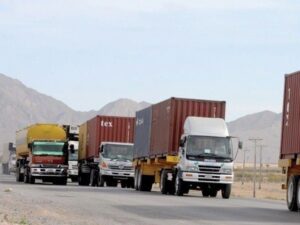 The Ministry of Industry and Commerce reported that in the first eight months of the current solar year, Afghanistan’s trade with regional countries amounted to $8.363 billion.
The Ministry of Industry and Commerce reported that in the first eight months of the current solar year, Afghanistan’s trade with regional countries amounted to $8.363 billion.
The ministry’s spokesperson emphasized that out of this total, $1.172 billion were exports.
During this period, Afghanistan’s primary export destinations included Pakistan, India, Iran, the United Arab Emirates, Uzbekistan, Kazakhstan, China, Turkey, Iraq, and Tajikistan.
Abdul Salam Jawad, the spokesperson for the Ministry of Industry and Commerce, stated: “Afghanistan’s trade during the first eight months of 1403 (solar year) reached approximately $8.363 billion, including $1.172 billion in exports and $7.191 billion in imports.”
Meanwhile, the Chamber of Commerce and Investment considers Central Asian countries a suitable market for Afghanistan’s agricultural products. It emphasizes the need for more trade and transit agreements to boost exports.
Khanjan Alokozay, a member of the board of directors of the Chamber of Commerce and Investment, said: “We have exports, but they are limited in other countries. A trade route to Moscow must be established. Efforts are underway to make the Moscow market more accessible and closer by addressing transport and transit issues that involve crossing through three or four countries, which could be resolved through a multilateral agreement.”
On the other hand, the Chamber of Agriculture and Livestock believes that supporting farmers and providing more facilities to traders would increase domestic production and create additional opportunities for exports.
Mirwais Haji Zada, the deputy head of the Chamber of Agriculture and Livestock, stated: “Exports to foreign countries like India, and especially China, should increase.
Russia and Kazakhstan are also excellent markets. We have been exporting through Uzbekistan, but this route occasionally faces logistical challenges. Exports should also be facilitated via waterways, with proper coordination with road transport.”
According to data from the Ministry of Industry and Commerce, Afghanistan’s top exports during these eight months included fresh and dried fruits, cotton, heng, and coal. Its major imports consisted of petroleum products, flour, rice, vehicle spare parts, machinery, textiles, liquefied gas, and cement.
Afghanistan’s Pomegranate Exports Hit $33 Million, But Challenges Persist
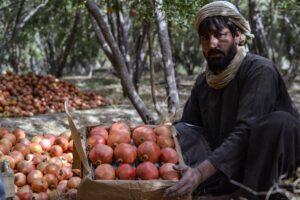
The Ministry of Industry and Commerce reported that in the first eight months of the current solar year (1403), Afghanistan exported over $33 million worth of pomegranates.
Abdul Salam Jawad, spokesperson for the Ministry of Industry and Commerce, stated that most pomegranate exports were sent to Pakistan, India, Tajikistan, Uzbekistan, Turkmenistan, Kazakhstan, and the United Arab Emirates.
The spokesperson said: “Afghanistan exported approximately 63,000 tons of pomegranates over eight months in 1403, valued at $33.3 million. The exports were made to countries including India, Pakistan, Tajikistan, Turkmenistan, Iraq, the UAE, Kazakhstan, and Uzbekistan.”
Some orchard owners who traveled to Kabul from provinces to sell their pomegranate produce said that while pomegranate yields increased this year, the market for selling the fruit remained sluggish.
Zia-ul-Haq, an orchard owner from Farah province, stated: “This year, our yields were high, but the problem is that there’s no proper market for selling.”
Mohammad Zarif, another orchard owner from Farah, said: “We paid 70,000 afghani in rent. The municipality charges 300 afghani per ton, there are seven to eight checkpoints along the way that collect 700 to 800 afghani, and transport costs us 1,000 afghani.”
Meanwhile, some traders highlighted that due to trade challenges with Pakistan, pomegranate exports decreased this year. They urged the defacto government officials to establish alternative trade routes and activate air corridors to boost exports.
Mohammad Agha Sadat, a trader, told: “We can’t even cover our expenses. One major issue is the low value of the Pakistani rupee, with 1,000 rupees equaling 240 afghani. Additionally, they tax us 76 rupees per kilogram. This year, we had no exports—our exports were zero.”
At the same time, the Ministry of Agriculture, Irrigation, and Livestock reported that pomegranate yields had increased this year compared to the previous year.
Misbahuddin Mustaeen, spokesperson for the Ministry of Agriculture, Irrigation, and Livestock, said: “The ministry is always working to provide greater facilities for the production and harvesting of agricultural products and supports farmers and orchard owners in selling their produce.”
Afghanistan, an agricultural country, relies heavily on this sector, with over 80% of its citizens engaged in agriculture for their livelihoods.
De facto goverment sign cement production deal in Logar province with private firm
 KABUL, Afghanistan — The De facto goverment-led Ministry of Mines and Petroleum signed a 30-year agreement on Tuesday with the private company SAKO Afghan to establish a cement production facility in the Altamor area of Logar Province.
KABUL, Afghanistan — The De facto goverment-led Ministry of Mines and Petroleum signed a 30-year agreement on Tuesday with the private company SAKO Afghan to establish a cement production facility in the Altamor area of Logar Province.
Hedayatullah Badri, the De facto goverment’s minister of mines, said during the signing ceremony in Kabul that the project would involve an investment of $145 million by SAKO Afghan. The facility is expected to produce 2,500 tons of cement daily, meeting a significant portion of Afghanistan’s domestic demand.
“This project will play a crucial role in the country’s reconstruction and economic development,” Badri said, adding that it would create hundreds of job opportunities.
Wu Zeidan, the president of SAKO Afghan, assured attendees that the project would be completed on schedule and in compliance with the contract’s terms, adhering to international standards.
The De facto goverment have said that, to date, they have signed contracts for four major cement production projects valued at a total of $623 million with both domestic and foreign investors, with work on these projects reportedly progressing.
However, the De facto goverment’s management of Afghanistan’s mining revenues has faced widespread criticism, with experts and observers raising concerns over a lack of transparency in how funds are allocated.
Travel Prices Lower Since Start of Kabul-Doha Direct Flights
 Direct flights from Kabul to Doha and vice versa have been launched by Kam Air. During the inauguration ceremony, the officials of this airline said that this initiative has facilitated travel for passengers on both sides.
Direct flights from Kabul to Doha and vice versa have been launched by Kam Air. During the inauguration ceremony, the officials of this airline said that this initiative has facilitated travel for passengers on both sides.
According to Kam Air officials, the airline will conduct three weekly flights between Kabul and Doha.
Jahed Azimi, the CEO of Kam Air, told: “An agreement was signed, and based on that, we launched the first flight. These flights provide ease for our passengers and Afghan citizens working in Qatar, as traveling to Afghanistan was previously challenging for them.”
Passengers also consider the launch of direct Kabul-Doha flights significant for saving time. They say that they used to travel via Dubai to reach Doha, which not only consumed time but also cost between $800 and $900 per ticket. However, the direct flights from Kabul to Doha have now eased the process for them.
Muzaffar Babakarkhil, a businessman, told: “Previously, we faced many challenges. We used to travel either through Dubai or Kuwait to reach Doha. Now we are happy that we don’t waste time and can travel directly to Doha.”
Shukrullah Helmandi, another passenger, said: “Previously, we used to travel through foreign airlines via Dubai, and the ticket cost $900. Now we are happy to fly with an Afghan airline for $425.”
After the first Kam Air flight landed at Doha Airport, a brief inauguration program for the direct flights was held with the participation of officials from the airports of both countries, the Ministry of Transport and Civil Aviation of Afghanistan, and officials from the Afghan embassy in Qatar.
Mohammad Naeem, acting head of the Afghanistan embassy in Qatar, said regarding these flights: “We hope this will be effective in the realm of trade. This [launch of direct flights] is a significant development and good news for our people.”
According to the Ministry of Transport and Civil Aviation, Afghanistan currently has direct flights to ten neighboring and regional countries. The launch of direct and transit flights to Qatar is expected to provide further ease for travelers.
Afghan Companies Shine at the International Halal Expo in Istanbul
 In this expo, 30 Afghan companies showcased various Afghan products, including mineral stones, carpets, and dried fruits.
In this expo, 30 Afghan companies showcased various Afghan products, including mineral stones, carpets, and dried fruits.
On the sidelines of the expo, the acting Minister of Industry and Commerce met with members of Turkey’s Foreign Economic Relations Board to discuss increasing trade volume between the two countries, as well as investment in sectors such as energy, technology, oil and gas, construction, logistics, mining, and textiles.
Afghan participants said the expo is beneficial for introducing and marketing domestic products, and they emphasized the need for organizing more international exhibitions.
Azmuddin Khanjani, an Afghan businessman, said: “This expo was of great importance. Representatives from 120 countries participated and showcased various export products. They showed significant interest in Afghanistan’s high-quality goods and fruits.”
Saber, another Afghan businessman, said: “We talked with American businessmen at this expo and held meetings with Turkish traders. We discussed the export of carpets, and they requested direct carpet exports from Afghanistan, suggesting that other processes be carried out in Turkey.”
The Afghan-Turk Business Association based in Istanbul also said the expo is instrumental in marketing Afghan products and enhancing relations between Kabul and Ankara.
The association’s president stressed that facilitating trade and industry would foster economic growth and expand Afghanistan’s trade with other countries.
Ezatullah Sadat, the president of the Afghan-Turk Business Association, said: “Cooperation with traders should increase, and more programs, conferences, and expos should be organized to help Afghanistan’s trade grow.”
Meanwhile, the Ministry of Industry and Commerce announced that the acting minister visited the most modern and historic state printing facility in Turkey on the sidelines of the Halal Expo.
Officials from this facility presented a coin minted in honor of Mawlana Jalaluddin Mohammad Balkhi to Nooruddin Azizi and the Islamic Emirate’s Consul General in Turkey.
First Rail Shipment From China Reaches Afghanistan Via Iran
 Mohammad Ashraf Haqshenas, spokesperson for the Ministry of Public Works, told TOLOnews that the first rail transit shipment from China reached Afghanistan through Iran.
Mohammad Ashraf Haqshenas, spokesperson for the Ministry of Public Works, told TOLOnews that the first rail transit shipment from China reached Afghanistan through Iran.
Haqshenas said that this shipment, which includes 1,000 tons of iron coils, arrived via Iran’s railway to Rozanak station in Herat province.
The spokesperson for the Ministry of Public Works stated: “With the completion of the Khaf-Herat railway project, new opportunities for Afghanistan’s economy will be created, and a suitable foundation for expanding trade and transit in the region will be established. The Ministry of Public Works of Afghanistan is striving to construct railway infrastructure to provide more facilities for the expansion of trade, transit, and increased transportation in Afghanistan.”
Some economic experts consider transportation through railways a significant step in enhancing Afghanistan’s transit connections with regional countries and emphasized the need for further investment in this sector.
“Since Afghanistan is a landlocked country and lacks access to open waters, it has always faced various challenges in trade. Whenever Afghanistan is connected to the global rail network, we will witness significant growth in the country’s trade,” said Abdul Nasir Reshtia, an economic expert.
“The first advantage of railways is that large volumes of goods can be transported from one country to another. Second, for Afghan traders, rail transit is far cheaper compared to air and road transportation,” said Abdul Shakoor Hadawal, an economic expert.
Earlier, a large shipment of Afghan commercial goods, in 55 cars, arrived directly from China to Afghanistan’s Hairatan port after 20 days of transit through Kazakhstan and Uzbekistan.
Afghanistan's Cultural Sector in 2024: Progress and Challenges
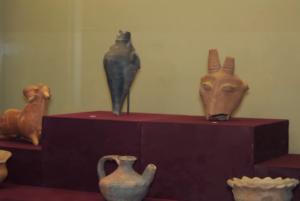 During the year, over eight historical monuments were restored in the provinces of Herat, Bamyan, Kandahar, Ghazni, and Kabul.
During the year, over eight historical monuments were restored in the provinces of Herat, Bamyan, Kandahar, Ghazni, and Kabul.
In 2024, Afghanistan’s cultural sector witnessed significant initiatives, including the restoration of ancient monuments, the documentation and discovery of historical sites, and the exhibition of antiquities.
Historical artifacts symbolize a nation’s identity, and Afghanistan, as a country rich in historical and cultural heritage, holds a unique position on the global stage.
According to statistics, the Ministry of Information and Culture prevented the smuggling of 538 historical artifacts in 2024.
These artifacts were identified and documented before being transferred to relevant museums in various provinces across the country.
The intercepted items included metal artifacts, objects from the Bronze Age, and Islamic-era items such as weapons, coins, and jewelry.
Khabib Ghofran, spokesperson for the Ministry of Information and Culture, stated: “The Ministry of Information and Culture has prevented the smuggling of 538 historical artifacts. These include metal objects, Bronze Age artifacts, and Islamic-era items like weapons, coins, and jewelry.”
In addition to uncovering historical sites, several residents and cultural activists in provinces such as Bamyan, Uruzgan, Badakhshan, Nimroz, and others expressed concerns over the destruction of historical monuments during the year.
All countries around the world have historical and archaeological sites, but certain developments have led to these artifacts and sites remaining hidden from public view.
In 2024, approximately 150 historical and archaeological sites were discovered and documented in various provinces of Afghanistan. Among the discoveries were 90 sites in Jawzjan province, 20 sites in Helmand province, and 13 sites in Farah province.
Faqir Maiwand, a former senior advisor to the Ministry of Information and Culture, said: “I hope Afghanistan’s historical monuments will be treated responsibly, and experts with skills and knowledge will be involved in their discovery and display.”
Restoration of historical monuments is one of the most valuable branches of architecture, ensuring the longevity of a historical monument for many years.
During the year, over eight historical monuments were restored in the provinces of Herat, Bamyan, Kandahar, Ghazni, and Kabul.
The strengthening of the Minaret of Jam in Ghor, the 80% progress in restoring the Kabul Bala Hissar, and the initiation of restoration work on the National Archives were among the notable restoration projects this year.
Mohammad Hasib Nasimi, the head of the Directorate of Preservation and Restoration of Historical Monuments, stated: “The Directorate of Preservation and Restoration of Historical Monuments has worked on restoring around 15 historical monuments since the beginning of 1403 (solar year). Fortunately, the restoration of over eight monuments has been completed, and work on five others is ongoing. Additionally, the restoration of three other historical monuments may be completed this week.”
Abdul Rahman Ehsas, a cultural expert, said: “Immediate action must be taken to preserve these sites, as it is the responsibility of the Ministry of Information and Culture, particularly since some of these monuments are UNESCO-listed.”
This year, the Ministry of Information and Culture established committees to restore historical sites, preserve cultural values, and protect the national languages of the country.
A packed year of sports in 2024 for the world and Afghanistan
 The year 2024 proved to be a momentous one for global sports, with events ranging from the AFC, UEFA, and Copa América championships to the Cricket World Cup, the Paris Olympic and Paralympic Games, and the Futsal World Cup. Afghanistan, too, made its mark on the international stage with standout performances in cricket and a historic debut in the Futsal World Cup.
The year 2024 proved to be a momentous one for global sports, with events ranging from the AFC, UEFA, and Copa América championships to the Cricket World Cup, the Paris Olympic and Paralympic Games, and the Futsal World Cup. Afghanistan, too, made its mark on the international stage with standout performances in cricket and a historic debut in the Futsal World Cup.
AFC Asian Cup: Football fever in Qatar
The year began with the AFC Asian Cup, hosted by Qatar from January 12 to February 10. Twenty-four Asian teams vied for the championship, with Qatar defeating Jordan 3–1 in the final to claim the title for the second time.
Cricket World Cup: A historic run for Afghanistan
The 2024 Cricket World Cup, co-hosted by the West Indies and the United States, saw India triumph over South Africa in the final. Afghanistan achieved a historic milestone by reaching the semifinals for the first time but fell to South Africa, narrowly missing a place in the final.
UEFA Euro 2024: A summer of European excitement
Held in Germany from June 14 to July 14, the UEFA European Championship captivated football fans across the continent. Spain claimed the trophy after defeating England in the final, adding another chapter to its storied football legacy.
Copa América: Argentina’s triumph
Simultaneously, South America’s Copa América enthralled fans, culminating in Argentina’s victory, which sparked celebrations across the continent.
Paris Olympics: A historic homecoming
The Paris 2024 Olympic Games marked the return of the Summer Olympics to France after a century. The games, which began two weeks after the conclusion of Euro 2024, featured an innovative opening ceremony along the Seine River. Afghanistan was represented by six athletes, including three women, competing in cycling, swimming, athletics, and judo.
Paralympics: Shining moments for Afghan athletes
The Paris Paralympic Games, held from August 28 to September 8, spotlighted Afghan athletes. Ibrahim Danishay, a para-taekwondo athlete, represented Afghanistan officially, while Zakia Khudadadi competed as part of the Refugee Team, earning a bronze medal in her discipline.
Futsal World Cup: Afghanistan’s debut
Uzbekistan hosted the 2024 Futsal World Cup, where Brazil clinched the championship. Afghanistan made its debut in the tournament, advancing to the Round of 16 before being eliminated by Paraguay, marking a historic achievement for the country in the sport.
Looking ahead to 2025
As 2024 comes to a close, the global sports calendar remains vibrant, with major events like women’s hockey and cricket tournaments, the Snooker World Cup, and the Asian Winter Games set to thrill fans in 2025.
This year reaffirmed the unifying power of sports, bringing nations together on fields, courts, and arenas while giving Afghanistan a chance to shine on the global stage.
Subscribe Now
Don’t miss our future updates! Get Subscribed Today!
© 2024 White Assembly. All Rights Reserved.
